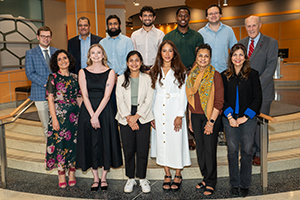President’s Entrepreneurial Fellows Share Insights, Celebrate 10th Anniversary of the Program
May 28, 2025 Claire Murphy
The fellows worked on five projects for Otter Immuno-Oncology, a seed-stage, preclinical biopharmaceutical company developing potential oncology therapies in areas of high unmet need.
At the beginning of May, the 2024-25 President's Entrepreneurial Fellows (PEF) cohort presented findings from their projects to an audience of their mentors, faculty, staff, students, and executives affiliated with the biotech ecosystem in Maryland. The 2024-25 cohort marked the 10th anniversary of the PEF program, which encourages innovation and discovery, peeling back the curtain on biotech entrepreneurism and giving students an up-close look at working in biotech startup companies.
Welcoming everyone to the presentations, Bruce E. Jarrell, MD, FACS, president of UMB, shared his pride for the PEF program, highlighting it as an example of UMB’s core values.
“With the PEF program, you see students, you see mentors standing up for students and making sure they're getting a good education and an opportunity to be entrepreneurs. And it gave me a certain sense of pride. … Our core values are sitting in this room: They are about discovery and innovation and a whole lot of other things. One of the reasons why I take pride in [this program] is because it really is what this University stands for.”
Giving advice to the fellows, Jarrell said, “Don’t give up. Make sure that you carry it over the goal line.”
This year, all of the PEF projects supported Otter Immuno-Oncology, a seed-stage, preclinical, immunology-focused biopharmaceutical company developing therapies with curative potential in areas of high unmet need in oncology. Otter was co-founded and is led by Darryl Carter, MD, a venture advisor for UMB and one of the PEF program leaders.
The PEFs pursued five projects, each focused on a different aspect of advancing Otter’s lead candidate, CD229, a novel marker of plasma cells that is intended for use in CAR-T cancer therapy.
Intellectual property issues in CAR-T cells
Examined the key legal requirements for the patentability of CAR-T cell therapy inventions. The analysis included a pivotal court case that addressed the validity of patents covering antigen receptors used in T cell therapy.
CD229 CAR-T cells for autoimmune diseases as follow-on indications
Looked into autoimmune diseases, where plasma cells play a key role in the pathogenesis, as another potential indication for CD229. IgA nephropathy, a leading cause of renal failure with a high economic burden for patients, was identified as a promising candidate.
De-centralized CAR-T cell manufacturing
Explored current CAR-T manufacturing method and identified opportunities for innovation. By pursuing a de-centralized model, it was found that Otter could dramatically decrease the cost of CAR-T therapy while increasing manufacturing efficiency and expediting delivery to patients.
Toxicity considerations for CAR-T cell therapies
Emphasized the need to evaluate any potential toxicity of CD229 cells for CAR-T therapy as a critical step for a U.S. Food and Drug Administration investigational new drug application. It was found that the CD229 cells have on-target toxicity and do not have off-target toxicity for normal human proteins. Additionally, findings highlighted the importance of implementing tests to predict CAR-T cell–associated neurotoxicity.
Global access to CAR-T cells
Looked at expanding access to CAR-T therapy in middle-income countries, specifically India and Brazil. The recommendation for Otter was to use a phased-entry model that begins with a private-sector pilot before moving to a regulatory and local trial setup. After those two phases, Otter could establish partnerships for local manufacturing to support public access.
Cohort of 11
The 2024-25 PEF cohort, the largest to date, included 11 students representing three of UMB’s seven schools as well as the University of Maryland Robert H. Smith School of Business:
- Utkarsh Agrawal, University of Maryland Robert H. Smith School of Business (Smith School)
- Chikezie Aguocha, University of Maryland Francis King Carey School of Law (Maryland Carey Law)
- Issac Chaudry, University of Maryland School of Medicine (UMSOM)
- Mia Condé, Maryland Carey Law
- Yassin Kadhim Ismaeel, University of Maryland School of Pharmacy
- Loryn Johnson, UMSOM
- Ryan Mayers, UMSOM
- Sreethi Musunuru, Smith School
- Cosette Schneider, UMSOM
- Aishwarya Venkataraman, UMSOM
- Ankush Verma, UMSOM
For Chaudry, an MD/PhD student who plans to pursue a career as a physician-scientist at the intersection of clinical care and basic science research, the PEF program offered a unique opportunity to see one possibility for this career in action. “I was interested in PEF because I wanted to see firsthand how entrepreneurial endeavors could accelerate the implementation of basic science research in clinical practice. I think it’s a great opportunity to interface with students from different disciplines — all of which bring vital perspectives to an entrepreneurial endeavor.”
Mayers, a PhD candidate in neuroscience, found that the hands-on nature of the PEF program allowed him to gain a deeper understanding of biotech entrepreneurship. “I first became interested in entrepreneurship during my undergraduate studies and continued seeking out those experiences during my master’s program. Over the course of seven years, I participated in biotech entrepreneurship competitions and training programs. None of that knowledge, though, was from hands-on experience — and despite it all being biotech-oriented, it also was not a very in-depth understanding of some of the more technical challenges in entrepreneurship. My project for the PEF program gave me hands-on experience thinking through and proposing a solution for an immediate technical challenge.”
The PEF program is open to all UMB students as well as students from the University of Maryland Robert H. Smith School of Business. For more information or to apply, please visit umventures.org/PEF.